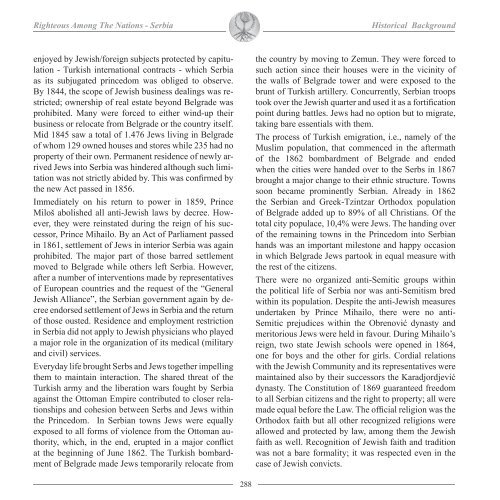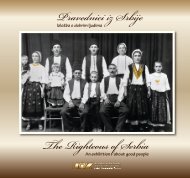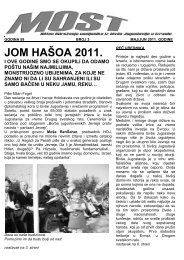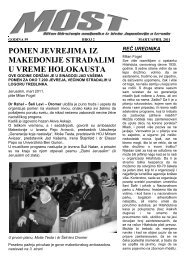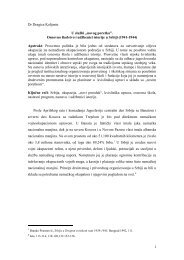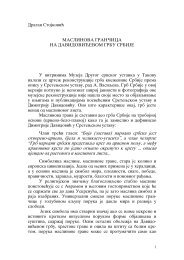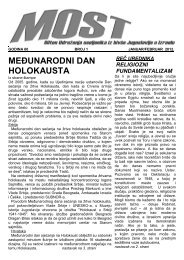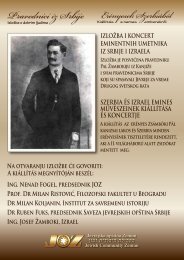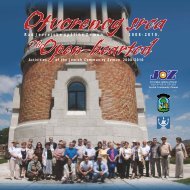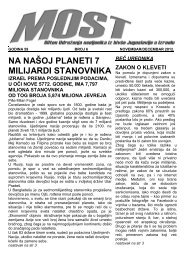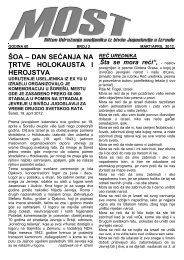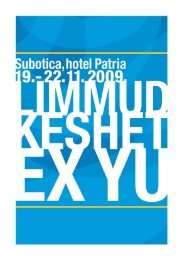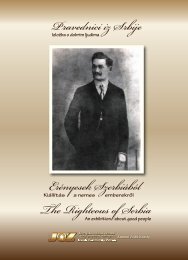Book on the Righteous - Jevrejska opština Zemun
Book on the Righteous - Jevrejska opština Zemun
Book on the Righteous - Jevrejska opština Zemun
Create successful ePaper yourself
Turn your PDF publications into a flip-book with our unique Google optimized e-Paper software.
<strong>Righteous</strong> Am<strong>on</strong>g The Nati<strong>on</strong>s - Serbia<br />
Historical Background<br />
enjoyed by Jewish/foreign subjects protected by capitulati<strong>on</strong><br />
- Turkish internati<strong>on</strong>al c<strong>on</strong>tracts - which Serbia<br />
as its subjugated princedom was obliged to observe.<br />
By 1844, <strong>the</strong> scope of Jewish business dealings was restricted;<br />
ownership of real estate bey<strong>on</strong>d Belgrade was<br />
prohibited. Many were forced to ei<strong>the</strong>r wind-up <strong>the</strong>ir<br />
business or relocate from Belgrade or <strong>the</strong> country itself.<br />
Mid 1845 saw a total of 1.476 Jews living in Belgrade<br />
of whom 129 owned houses and stores while 235 had no<br />
property of <strong>the</strong>ir own. Permanent residence of newly arrived<br />
Jews into Serbia was hindered although such limitati<strong>on</strong><br />
was not strictly abided by. This was c<strong>on</strong>firmed by<br />
<strong>the</strong> new Act passed in 1856.<br />
Immediately <strong>on</strong> his return to power in 1859, Prince<br />
Miloš abolished all anti-Jewish laws by decree. However,<br />
<strong>the</strong>y were reinstated during <strong>the</strong> reign of his successor,<br />
Prince Mihailo. By an Act of Parliament passed<br />
in 1861, settlement of Jews in interior Serbia was again<br />
prohibited. The major part of those barred settlement<br />
moved to Belgrade while o<strong>the</strong>rs left Serbia. However,<br />
after a number of interventi<strong>on</strong>s made by representatives<br />
of European countries and <strong>the</strong> request of <strong>the</strong> “General<br />
Jewish Alliance”, <strong>the</strong> Serbian government again by decree<br />
endorsed settlement of Jews in Serbia and <strong>the</strong> return<br />
of those ousted. Residence and employment restricti<strong>on</strong><br />
in Serbia did not apply to Jewish physicians who played<br />
a major role in <strong>the</strong> organizati<strong>on</strong> of its medical (military<br />
and civil) services.<br />
Everyday life brought Serbs and Jews toge<strong>the</strong>r impelling<br />
<strong>the</strong>m to maintain interacti<strong>on</strong>. The shared threat of <strong>the</strong><br />
Turkish army and <strong>the</strong> liberati<strong>on</strong> wars fought by Serbia<br />
against <strong>the</strong> Ottoman Empire c<strong>on</strong>tributed to closer relati<strong>on</strong>ships<br />
and cohesi<strong>on</strong> between Serbs and Jews within<br />
<strong>the</strong> Princedom. In Serbian towns Jews were equally<br />
exposed to all forms of violence from <strong>the</strong> Ottoman authority,<br />
which, in <strong>the</strong> end, erupted in a major c<strong>on</strong>flict<br />
at <strong>the</strong> beginning of June 1862. The Turkish bombardment<br />
of Belgrade made Jews temporarily relocate from<br />
<strong>the</strong> country by moving to <strong>Zemun</strong>. They were forced to<br />
such acti<strong>on</strong> since <strong>the</strong>ir houses were in <strong>the</strong> vicinity of<br />
<strong>the</strong> walls of Belgrade tower and were exposed to <strong>the</strong><br />
brunt of Turkish artillery. C<strong>on</strong>currently, Serbian troops<br />
took over <strong>the</strong> Jewish quarter and used it as a fortificati<strong>on</strong><br />
point during battles. Jews had no opti<strong>on</strong> but to migrate,<br />
taking bare essentials with <strong>the</strong>m.<br />
The process of Turkish emigrati<strong>on</strong>, i.e., namely of <strong>the</strong><br />
Muslim populati<strong>on</strong>, that commenced in <strong>the</strong> aftermath<br />
of <strong>the</strong> 1862 bombardment of Belgrade and ended<br />
when <strong>the</strong> cities were handed over to <strong>the</strong> Serbs in 1867<br />
brought a major change to <strong>the</strong>ir ethnic structure. Towns<br />
so<strong>on</strong> became prominently Serbian. Already in 1862<br />
<strong>the</strong> Serbian and Greek-Tzintzar Orthodox populati<strong>on</strong><br />
of Belgrade added up to 89% of all Christians. Of <strong>the</strong><br />
total city populace, 10,4% were Jews. The handing over<br />
of <strong>the</strong> remaining towns in <strong>the</strong> Princedom into Serbian<br />
hands was an important milest<strong>on</strong>e and happy occasi<strong>on</strong><br />
in which Belgrade Jews partook in equal measure with<br />
<strong>the</strong> rest of <strong>the</strong> citizens.<br />
There were no organized anti-Semitic groups within<br />
<strong>the</strong> political life of Serbia nor was anti-Semitism bred<br />
within its populati<strong>on</strong>. Despite <strong>the</strong> anti-Jewish measures<br />
undertaken by Prince Mihailo, <strong>the</strong>re were no anti-<br />
Semitic prejudices within <strong>the</strong> Obrenović dynasty and<br />
meritorious Jews were held in favour. During Mihailo’s<br />
reign, two state Jewish schools were opened in 1864,<br />
<strong>on</strong>e for boys and <strong>the</strong> o<strong>the</strong>r for girls. Cordial relati<strong>on</strong>s<br />
with <strong>the</strong> Jewish Community and its representatives were<br />
maintained also by <strong>the</strong>ir successors <strong>the</strong> Karadjordjević<br />
dynasty. The C<strong>on</strong>stituti<strong>on</strong> of 1869 guaranteed freedom<br />
to all Serbian citizens and <strong>the</strong> right to property; all were<br />
made equal before <strong>the</strong> Law. The official religi<strong>on</strong> was <strong>the</strong><br />
Orthodox faith but all o<strong>the</strong>r recognized religi<strong>on</strong>s were<br />
allowed and protected by law, am<strong>on</strong>g <strong>the</strong>m <strong>the</strong> Jewish<br />
faith as well. Recogniti<strong>on</strong> of Jewish faith and traditi<strong>on</strong><br />
was not a bare formality; it was respected even in <strong>the</strong><br />
case of Jewish c<strong>on</strong>victs.<br />
288


